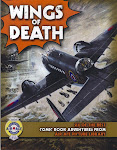M'Guire's previous two novels had been of interest to fans of lost race yarns as the first concerned a remote island inhabited by monsters and the second a feral child aiding a lost race in Africa. The latter, Beast or Man? was reprinted in 2009 by Ramble House, one of the first titles under their Dancing Tuatara Press imprint.
In Spider Island an ailing ex-service man, drudging as a clerk, takes a holiday at a remote place by the sea, and saves from drowning a golden-haired society girl, whose brother owns a yacht. The latter is the means by which the clerk plans to go adventuring after discovering the location of a strange treasure. The Scotsman (19 September 1929) offered the following description:
Strange things have been met with, in fact and in fiction, in the South Seas; but never anything resembling the discoveries made at and in the vicinity of Mr Sean M'Guire's Spider Island ... the key to the existence and locality of which was found in the familiar form of a manuscript contained in a sealed section of bamboo cast up on the shores of England within reach of the hands of a holiday-making clerk. Men who have been turned into rocks and yet continue to live through some kind of suction from the soil; slugs, fifteen feet long, that live in caves and absorb their human and other prey by enclosing and digesting them in sight of the spectators, carnivorous creepers, and the diabolical priests of a horrifying cult that, under the influence of a potent drug, can turn themselves into a fluent mass, more deadly than anything that moves on limbs, above all the "Spider" itself, are among the wonders revealed in a tale that reads in part like the outcome of nightmare. To enjoy it, one must put aside all thought of the probable and possible, and be content to follow the guidance of wild and unrestrained imagination.Spider Island does not appear to have been widely reviewed on its appearance in September 1929, and Beast or Man? was equally poorly reviewed the following February. John Pelan, introducing the latter, considered M'Guire's two novels "exceptional" and "a breath of fresh air".
Both books, says Pelan, raised serious moral and ethical issues. "Both are far deeper than anything [H. Rider] Haggard attempted, though both operate easily enough as pure pulp adventures." In Beast or Man?, big-game hunter Dick Fearless questions the banality of his life and the morality of trapping intelligent creatures for exhibition. In later chapters, the half-human, half-gorilla progeny of a human boy raised by apes, is the inspiration for the title.
M'Guire published only one more novel, Paul Garroway, Priest, which again made little impact. The Aberdeen Press & Journal (15 April 1931) was one of the few papers to carry a review:
Mr Sean M'Guire has given us a readable story of the war which, however, principally concerns Paul Garroway, who preferred the rural church living to sitting on an office stool. Paul married young. Shortly after the war broke out he was appointed a padre and posted to an infantry battalion. He was broad-minded and got on well with officers and men alike. he was respected by all ranks; he gave good advice and helped many in their troubles, and was altogether an influence for good in the battalion. In France he was awarded the V.C., was wounded, sent home, and then dispatched to Egypt, where his beliefs were rudely shaken as the result of discussions with Singleton, the scientist. He began to lose faith and hope and it was a nerve-racked Paul Garroway who returned to England. That briefly is the story, which winds up with an incident following the Armistice showing how he regained his faith. We get the happy ending, although it is not very satisfying. The story is well sprinkled with humour supplied by the irrepressible Bridgeworth, who is never daunted.Again, it appeared that M'Guire was attempting to write a novel which would ask serious questions about faith and religion in the same way that Beast or Man? questioned the belief that Europeans were inherently superior to African tribesmen.
With Paul Garroway, Priest, M'Guire vanished as an author. In fact, he had never existed.
Sean M'Guire was a pen-name, but the clues to his real identity are almost non-existent. The sole source of information is a brief paragraph in "Town Talk and Gossip", compiled for The Sporting Times (9 November 1929) by "The Tramp".
The first problem here is that Merstham is in Surrey, not Norfolk. However, the mention of ornithology makes me believe the author meant Martham, near the coast of Norfolk some 20 miles north-east of Norwich. The village falls within the Broads National Park and is home to the Martham Broad nature reserve."Moving" by Plane.THAT prolific writer of thrillers, Sean M'Guire, is nothing if not original. He was moving from London to Merstham, in Norfolk, and nothing would suit him but to go by air. He is an ex-R.A.F. officer, and was accompanied by another war-pilot, Major Gibson. His real name ("Sean M'Guire" being but a pseudonym) appears on the title-pages of several learned works of ornithology, so versatile is he. His collection of birds' eggs is unrivalled in this country.
Unpacked, the information contained in this paragraph is skimpy at best: a former R.A.F. officer, assisted by his friend, Major Gibson, has moved from London to Martham. He has published "several" books on ornithology and has a large collection of birds' eggs.
None of these clues have yet yielded a name for the author behind the Sean M'Guire novels, but they're a first step in the right direction.
























































No comments:
Post a Comment